
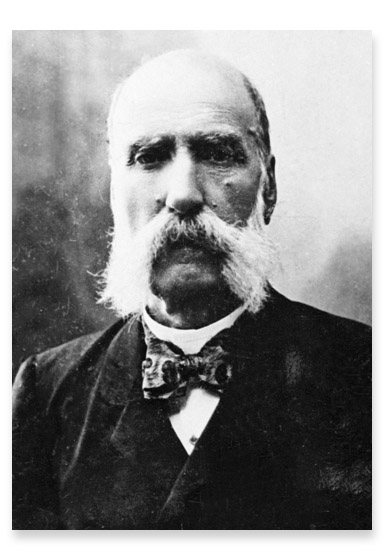
Doctor Georgi Mirkovich (1826 –1905)
A medical doctor and social figure, corresponding member (1881) and full member (1884) of Bulgarian Academy of Science.
He was Sava Dobroplodni's disciple; he continued his studies in the Seminary in Kiev, then he finished a French and Greek school in Tzarigrad (Istanbul, Turkey) and from 1851 to 1856 he studied medicine in Montpellier, France where Napoleon III rewarded him with a medal oh honour for treating cholera patients in a period of epidemic outbreak. After his return to Bulgaria he supported Dragan Tzankov and his Uniate movement; he was a member of the delegation to Pope Pius IX in Rome for which he was awarded a golden medal by the Vatican. Because of his active contribution to Bulgarian national cause the Turkish oppressors chained him and sent him on foot to Tzarigrad where he was sentenced to hard labour for life in Diarbekir. He was set free after the Russian-Turkish war of 1877-1878 and after that he settled in Sliven where he worked as hospital superintendent and Men's High school headmaster. Dr Mirkovich was the first medical doctor in Bulgaria to use the methods of homeopathy. He was Member of Parliament for two mandates, he was co-founder of "Balgarsko Zname" newspaper, he published "Nova Svetlina" magazine from 1891 to 1896 and "Zdravoslovie" magazine from 1893 to 1896.
His first meeting with Master Peter Deunov was in 1900 at the first gathering of the Chain. Influenced by him, Mirkovich started publishing "Videlina" magazine (1902 – 1905) with articles for spiritual ennoblement. He came to the end of his days on Earth in the presence of the Master. In his will it is written: "…Always ask the advice of my spiritual teacher doctor Peter Deunov."
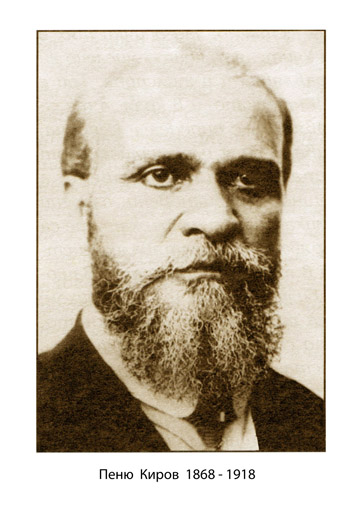
Penyu Kirov (1868-1918)
Penyu Kirov was one of the first three disciples of the Master Peter Deunov. He was born in Karnobat, but later on he lived in Burgas. When he was 17, he joined the army as a volunteer in the Serbian-Bulgarian War.
He met Peter Deunov through correspondence which started in 1898. In 1900 he was summoned along with Todor Stoimenov and Dr Georgi Mirkovich to meet the Master in Varna and this marked the beginning of the gatherings of the White Brotherhood.
Penyu Kirov was a travelling book seller and he often visited the new brotherly societies where he gave his spiritual talks. He acted under the Master's guidance in this – he was told what to say, how to instruct and advise his new brothers and sisters. He talked to them about the Master's ideas, about the coming awakening of the whole manhood which would achieve new heights in the spiritual development.
Penyu Kirov was the leader of the group of brothers in Burgas but he also followed the Master's advice about most of the smaller towns in Southern Bulgaria. He maintained relationship with the brothers and sisters through the visits he made once or twice a year in these towns. Each year Penyu Kirov left Burgas for 2-3 months to travel on foot from village to village, from town to town, to meet people, interested in spiritual life.
His contemporaries remember him for his hardworking and perseverance, for his mild and soft temper.
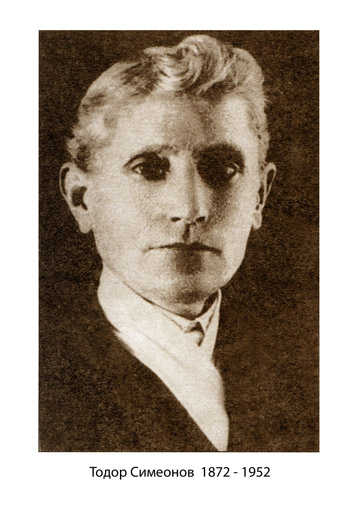
He was born in Pazardzhik. In 1891 he moved to Burgas to work as a clerk in Burgas Regional Court.
He was interested in the spiritual from an early age and he sought the meaning of life. He joined different societies; he read materialistic literature and books in spiritism. His spiritual searching led him to Penyu Kirov and to the founding father of spiritism in Bulgaria – Dr. Georgi Mirkovich who published Videlina magazine.
A friend of theirs, Vasil Kozlov, said that he would introduce them to Peter Deunov: "a very spiritually advanced man". And Kozlov did indeed talk with him about these three friends. The Master wrote to them and thus the correspondence between them began. The three men – Todor Stoimenov, Penyu Kirov and Dr. Mirkovich met and read the Gospel, and they discussed spiritual topics. After almost two years of writing letters, on Easter in 1900, the first disciples met the Master in person in Varna. Since then Todor Stoimenov followed the path the Master showed him.
In 1914 he moved to Sofia. Since the establishment of "Izgreva" until the end of his days, he lived there and served as a treasurer for the Brotherhood.
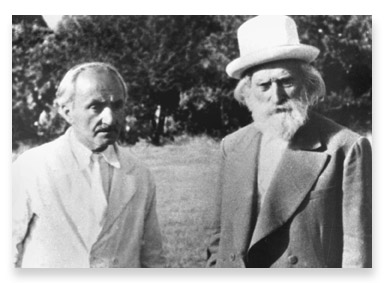
Boyan Boev was one of the Master's closest disciples. He was born in Burgas. His father, Dimitar Boev, was the owner-editor of one of the first newspapers in Burgas after the Liberation – Golgotha, later on named New Epoch.
Boyan Boev was a highly educated man. He spoke French, German and Russian. He was a student in Munich before the Balkan war. He later on graduated from Sofia University with major in Natural Sciences and after that worked as a teacher in several towns in the country.
The earliest evidence of Boyan Boev's meetings with the Master date back to 1912, when he attended a gathering in Veliko Tarnovo. He lived for a time in Svishtov after 1919, but he was fired because of his support for the Master's ideas. In 1924 he moved to Sofia and devoted his life to the Brotherhood. He was an active participant in all brotherly activities. Boyan Boev was good at short-hand writing and he was always by the Master's side to record all his thoughts and statements in the talks he witnessed. Thus he contributed to the preservation of precious knowledge which otherwise would not have reached us. Later on he edited his notes and sent them over the years as letters to the brothers and sisters who lived away from Sofia. In each of these letters a conversation with the Master on a different topic is recorded.
In 1937, on the occasion of 1000 anniversary from the appearance of the Bogomil movement, Boyan Boev published the book The Bogomil Mission in Relation to the Slavonic Mission.
In 1942 he wrote and published another research paper of his – The Master on Breathing, and in 1943 his deep and thorough psychological study on the topics of education was published – The Master on Education.
Tireless and devoted, Boyan Boev was always a central figure in "Izgreva". He did contribute enormously for the preservation and dissemination of the Master's Word.
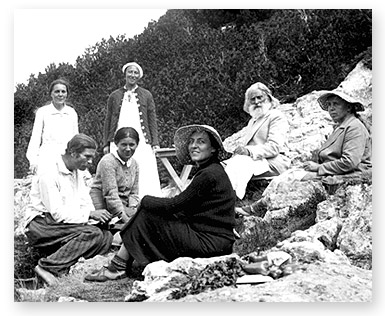
The three stenographers – Savka Keremedchieva, Pasha Teodorova, Elena Andreeva
The three stenographers are Master Peter Deunov's followers whom we are most indebted to for the opportunity to read his Word today. They were always around him; they listened to and took shorthand notes of his every word, dedicating their lives to the task of taking in shorthand all his talks and lectures and then transcribing their notes. Each of the talks was first edited by them and then checked and approved by the Master; the talks were later printed and preserved. Due to their efforts and diligence the Word reaches us today.
This is what Elena Andreeva says about their joint work: "All three of us used to write down everything that the Master spoke. The work for transcribing the Word we divided between ourselves in complete harmony and accord. If one of us expressed preference for working on a certain lecture or talk, the other two always readily agreed. We tried to put our work in some order and to this end we divided the Master's Word in sections: Sunday talks, School lectures, Talks at gatherings, Mountain talks, Morning talks, Special talks – talks given by the Master upon brotherly holidays – March 22nd, St Peter's Day, Talks before the sisters and talks given on other occasions. Each of us kept a special notebook for every section. And when, for example, Pasha was transcribing a Sunday talk, she was using her notebook along with Savka's and mine, and thus she transcribed the Word from all three notebooks. For all the work done each of us was responsible before her own conscience. There was no control; there was complete trust for the work of each. We had accepted to transcribe the Word and we did it with a sense of responsibility."
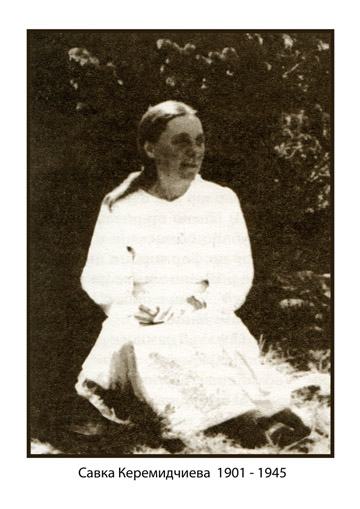
Savka Keremedchieva (1901 – 1945)
She was born in Tsaribrod. When she was 4 years old, The Master visited her family after a lecture in phrenology. Soon after that the family moved to Sofia to attend his lectures. She was just 12 when she went up to the Master and said: "Master I want to study with you." Savka grew up near the Master; she was a sharp student, interested in phrenology, chiromancy. He often gave her different tasks, watched over her efforts and provided spiritual guidance.
Savka Keremedchieva studied philology and pedagogy at the University.
In 1921 along with Elena Andreeva and Pasha Teodorova, she began taking in shorthand the Master's lectures. She lived with the other two stenographers in "Izgreva". They transcribed the lectures given by the Master, then he checked them and the lectures went for printing. This was hard work and highly responsible which required attention and concentration; Savka participated in it to the best of her abilities and with all her heart. The value and importance of this work is invaluable today.
Savka was always around the Master and often, in conversations with him, she asked questions she came upon in her spiritual work. She strictly wrote down all the answers that the Master gave her and in 1924, in Rila, she presented to him a booklet especially prepared by her – "Sacred Words of the Master. Greetings to his Disciple". The Master refuted her gift and the same booklet was published in 1938 on the initiative of another disciple from "Izgreva". As a result of her conversations with the Master, Savka created "The New Sacred Words" which were transcribed from her notes in shorthand by Boris Nikolov and published after her death as the second and third volume of "Sacred Words of the Master".
In 1942 Savka Keremedchieva went to Latvia where she gave a series of lectures about the Master's teaching. Upon her departure he said to her: "Remember, now you are a saint, remember, the people of Latvia will accept the Master in your face. The sisters and brothers will kiss your hand and you will speak to them in my name."
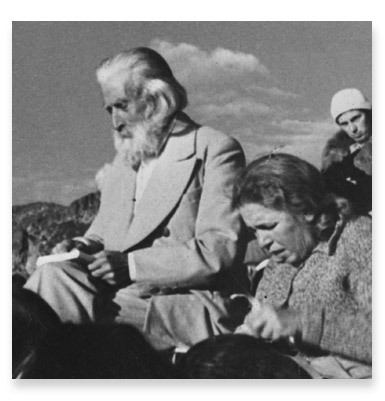
She was born in Bolgrad, Ukraine. She grew up and was educated in Sofia. She studied chemistry and worked for a time in a high school in Sofia.
She first met the Master Peter Deunov in 1915 and started to attend the lectures which he gave regularly on 66 Opalchenska Street. In 1916 she was invited and became a stenographer of his talks. She participated in the whole process; from transcription to editing and printing.
From 1916 to 1920 Pasha worked alone on taking down the talks in shorthand and then transcribing them. She moved to live in "Izgreva" after the Master started his regular talks in the newly built centre there. From 1928 onwards, she and the other two stenographers lived in a small building near the centre, which was lovingly called "the Steamship". The Master often visited and discussed with them the talks and the problems with their publishing. Life in the "Steamship" was strenuous, full of hard work. Pasha, Elena, and Savka participated actively in the brotherly life, they took in shorthand each talk and lecture; they worked on the tasks and did the exercises given in the School; they transcribed the shorthand notes and then Pasha edited them to make them acceptable according to the literary language norms. Then she read the edited texts to the Master and added the corrections he made.
Elena Andreeva remembers her: "And so Pasha developed her own method of work. In the editing process she made changes guided by the advice of the Master. Besides, Pasha had been listening to the Word for many years. She understood it. And she always had the opportunity to ask the Master about any unclear thought… We were his workers and he helped us to do our work better."
One of the Master's disciples – Nikolai Doynov, described Pasha in his memoirs with the following words: "She is a sister with valuable qualities such as intelligence and character. She is quite temperate in manner and patient to listen to her companion, because she likes to talk and is able to nail her opponent with iron-clad logic. She had perfect command of grammar and the correct sentence structure. That is why she edited all talks, before they went for publishing."
Pasha Teodorova remained devoted to dedicated work in service of the Teaching of Master Peter Deunov and the Brotherhood for the rest of her life.
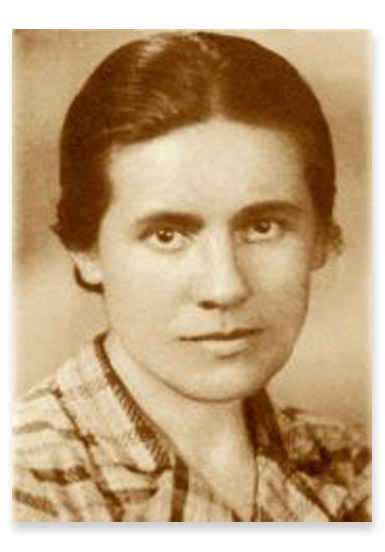
She was born in a small village in Bitolya, Macedonia, where there was only a primary school. She went through a lot of hardships and difficulties but finally managed to graduate from the First Girls' High School in Sofia and then she studied philosophy at the University of Sofia.
Elena Andreeva first met the Master in 1920. She started attending his talks and from 1921 onwards she began writing them in shorthand.
In her memoirs she tells us: "The opening of the School was the beginning of an organized communal life – talks, lectures, exercises for all, Paneurhythmy, trips, hikes in Rila, a community canteen. And all the while we used to sing the Master's songs. Every aspect of the community activities was governed by the Master. His leadership was not enforced, it was free. Everybody came because they wanted to participate in the community life; nobody forced us to do anything. The Master led governed, but his leadership was invisible. There were rules in the School, but everybody made their own decisions. This spirit of freedom that ruled the School was something new, powerful and mighty. As if the Master's leadership was not on Earth, but in the air. We did feel the strong hand of the Master, yet we also felt inner freedom."
In 1928 she moved to "Izgreva" to live with the other two stenographers – Savka Keremedchieva and Pasha Teodorova. In her memoirs she writes the following about their life in "The Steamship":
"The three of us were different in character, came from different social background, and we were even different nationally, yet we lived in harmony. The Master often came to us. He kept our spirits up with his attention and care. He had different approach to each of us, but he was equally understanding to our needs. Our life in "The Steamship" was intense. The very nature of our work – the fact that we wrote down the Master's Word, - obligated us to embody that Word in our lives. Each one of us worked eagerly and diligently; each one of us made sure to give the very best of our efforts."
After 1944 when the Master had reached the end of his earthly path, Elena Andreeva continued to work with the Word and for almost 10 years she transcribed shorthand notes, which remained in rough until then. In 1954 she completed her work on the Master's Word, still unpublished by then, and gave it away for safekeeping.
The new political regime persecuted her and in 1961 she left "Izgreva".
Until her death in 1990, Elena Andreeva continued to keep and cherish the Master's Word.
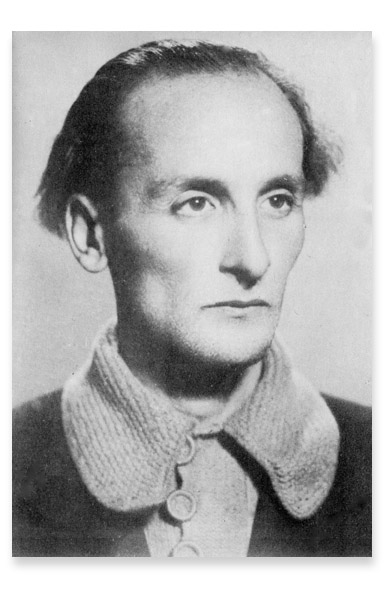
He was born in Gabrovo. He finished his secondary education in the so called Aprilov High School, and then he went to Sofia University to study Natural sciences and Philosophy. He was skilled in shorthand. His yearning for freedom and spiritual growth led him to the Master's ideas. He joined the group of brothers and sisters which formed a small community around him.
When the Master told them: "All of you that are at the University should finish it but you should also learn some craft so you can be free", Boris Nikolov then started as an apprentice with several craftsmen. He was first a wood-carver, after that he helped a violin maker to make different musical instruments. Then he learned the art of working with stones with a mosaic maker.
He wrote short stories about animals and published a collection of short stories – memoirs "A Meeting with the Little Brothers". In "Izgreva" he wrote down the Master's words along with the stenographers.
During the summer school in Rila, Boris Nikolov used his carving skills to leave messages for the future generations. The texts engraved in the smooth rocks under the Prayer Peak, on Salonite (the Halls) and by the spring "The Giving Hands" are his doing.
After the Master's death on 27th December 1944, Boris Nikolov was elected Chairman of the Brothers' Council. This was done in keeping with the Master's advice before he was gone. His first actions were to organize the activities in the Brotherhood to manage the most crucial task – to preserve the Word. He started the process of printing and preserving of all lectures of the Master that had remained in shorthand until then. A printing centre was set up in "Izgreva". Over 50 books with lectures and talks were published between 1944 and 1949. The new communist regime persecuted the members of the Brotherhood, the police were after them and they were constantly being checked upon. Preservation of the printed Word was a risky and dangerous undertaking for the disciples.
In 1957 a major campaign was organized against the Brotherhood. All over the country house searches were set up and all literature about the Master was confiscated. Thousands of books with talks, handwritten notes, pictures, personal notes and various Brotherhood materials were taken away. Financial inspections were conducted and accounts were forged. The assets of the Brotherhood were nationalized. Boris Nikolov and some other brothers were arrested and tortured. After a forged trial they were sentenced to prison for 12 years. In 1963 they came under amnesty and were set free.
Boris Nikolov remained Chairman of the White Brotherhood until the end of his life and he worked following the Master's advice and guidance.
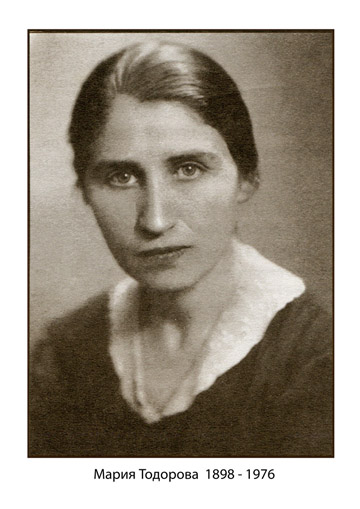
She was born in Panagyurishte in a wealthy family. Her spiritual searching led her to Master Peter Deunov and she became one of his disciples. She often had conversations with him in his home on 66 Opalchenska Str. At first the Master gave her little spiritual tasks – first some work with the Bible, then in the area of psychology. He encouraged her to develop her musical talent and to go to the Musical Academy.
Maria's perseverance in the fulfillment of the tasks and exercises given to her was legendary. She was an honest person, frank and open. Her manner always betrayed the dignity of a person who had found his path in life and was truly determined to follow it. She wrote about her meetings with the Master the following: "When I went to talk with him, I considered sacrilege to hide even the smallest detail from the Master. And I knew that for my honesty and open heart, he responded to my pleas and always helped me."
Following the Master's advice, Maria Todorova became Boris Nikolov's companion in life. The relationship between the two of them was a sacred friendship, based on a common path of service. She wrote about Boris Nikolov in her diary: "Everything that Boris did, seemed to me pure perfection." He, on his part, admired her dignity, her sincerity and integrity.
After the Master's death, along with other close disciples, Maria worked for the preservation of his deeds and for the protection of his Word. Along with Metodi Konstantinov, Boyan Boev and Boris Nikolov, she helped to prepare and publish the most valuable book ever written about him – "The Master".
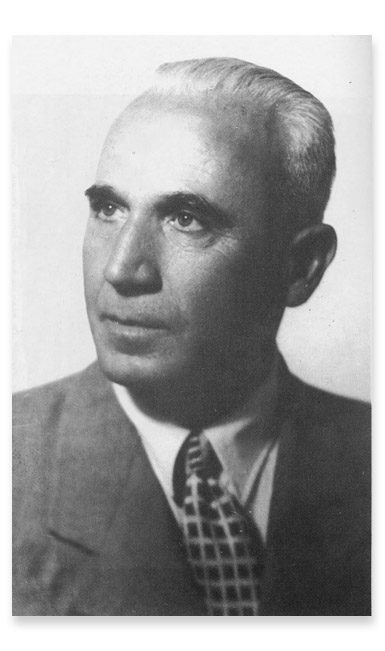
Metodi Konstantinov (1902-1979)
Philosopher, writer, social figure. One of Master Peter Deunov's most educated and cultured followers.
Metodi Konstantinov studied philosophy in Sofia and international law in Poland where he took his Doctor's degree at Poznan University.
After his return to Bulgaria he worked in the Ministry of Internal Affairs and the Ministry of Finance. As a director of the Propaganda Office in 1943 he knew about the plan for the deportation of Bulgarian Jews to the Death camps and he played a major part in their salvation.
Doctor Metodi Konstantinov is the author of many publications in Bulgarian and in French and his work established his position as a serious researcher with a wide range of scientific interests and brought him international recognition. Among his works are studies of scientific and esoteric nature ("World Astrosociology", "The New Culture in the Age of Aquarius", etc.)
On March 22nd 1022 Metodi Konstantinov put up his tent on Bourchier's meadows and became the first man to settle in the White Brotherhood's settlement "Izgreva".
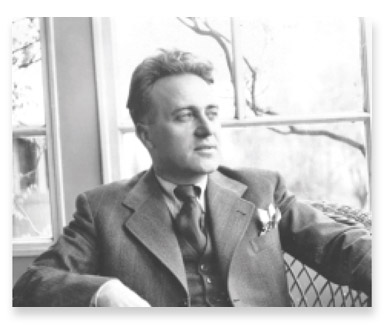
Essay writer. A person with extensive cultural interests and profound encyclopaedic knowledge.
Georgi Tomalevski was born in Krushovo, Bitolya region on September 16th 1897 in the family of Bulgarian patriots who took active part in the uprising of Ilinden. After the uprising was severely crushed the family moved to Sofia. In 1925 he graduated from Sofia University where he studied physics and astronomy. His interest to literature was greater though and when he was thirty years old he won a literary award for his essay "Dushata na Macedonia" ("Macedonia's Soul"). Georgi Tomalevski's works of fiction are in various genres but the essay is most prominent with him. He was among the first great essayist in Bulgaria and one of the founders of the Essayist Society in the country (1935).
In 1922 he met Master Peter Deunov; he accepted his teaching and joined the spiritual movement. He was one of the founders of "Grain of Wheat" magazine, published by the White Brotherhood Society.
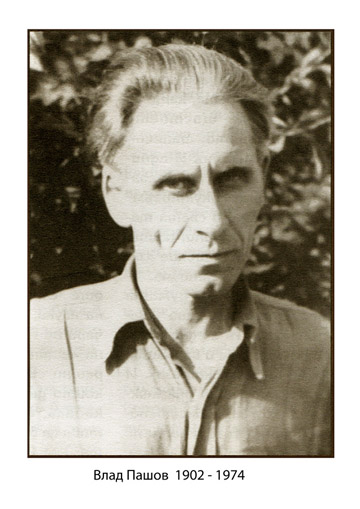
He was born in Poibrene, near the town of Panagyurishte. When he was young he was fascinated by the ideas of the anarchist Kropotkin. When he was in high school, one of the Master's disciples was his teacher – Boyan Boev. He introduced him to the Master's ideas and philosophy. Since then Vlad became his disciple and led a meaningful life in which the good of others was his good, too, and the others' need was his need, as well.
Vlad Pashov participated in the publishing activities of the Brotherhood. In 1923, he and two other disciples set up the first printing house of the Brotherhood on 14 Oborishte str. He wrote for the Grain of Wheat magazine and he worked on articles for the Brotherhood newspaper.
Vlad Pashov was a quiet man, modest and mild in temper; he was always ready to be of service for anyone in need. He was one of the volunteers in the group of brothers who used to climb to the Seven Rila Lakes for years until they set up the camp near the Second Lake.
He loved nature and the mountain. He worked on a series of articles, published in Brotherhood newspaper under the title of "Astrology as an Introduction to the Hermetic Science and Philosophy." Later on these articles became central for the contents of his book "Astrology", which was the first of its kind, written by a Bulgarian.
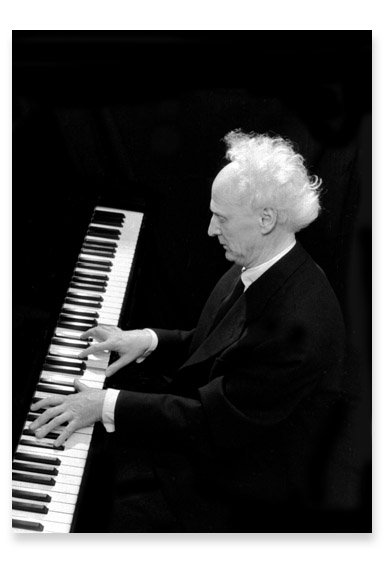
Composer, public figure, documentarian
He was born in Nova Zagora. He studied in Musical Academy playing the piano in Prof. Dimitar Nenov's class. From 1949 for over three decades he worked in Popular Science Film Studio "Vreme", TV Film Studio "Ekran", Film Studio "Sofia" and Military Cinematography. He was a member of the Union of Bulgarian Composers and Union of Bulgarian Film Makers.
He wrote music for dozens of documentaries, feature films, popular science films and cartoons; he also composed symphonic orchestra plays and instrumental music. He worked with records in monasteries and ancient libraries in Italy, France and Germany. He received many awards for film music in his country and abroad.
He helped his friend Boris Rogev to publish his "Astronomical Basis of the First Bulgarian Calendar (Old Bulgarian Calendar)".
He settled in the Brotherhood settlement "Izgreva" with his two sisters in the early 30s. Master Peter Deunov's philosophy influenced deeply his views. He orchestrated the Paneurhythmy for a large symphonic orchestra upon Master's request. In 1974 he recorded the music played by Monte Carlo's philharmonic orchestra.
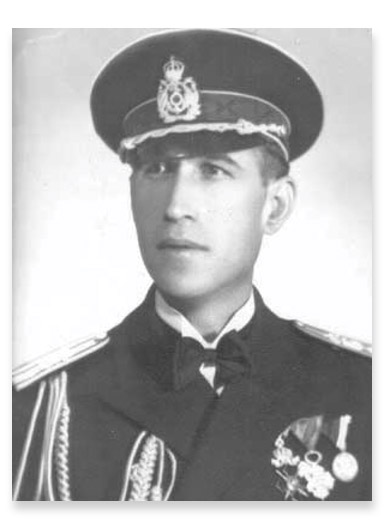
Captain Boris Rogev (1898-1976).
He was born on September 21st 1898 in the village of Voevodino, Varna region. He was related to Bulgarian freedom fighter Hadji Dimitar on his mother's side. In 1921 he graduated from the naval school. From 1927 to 1931 he studied astronomy and navigation at the Sorbonne in Paris where he got his degree "licensee" in mathematics, physics and astronomy. In 1931 he established the Hydrographic Department of the State Military Geographic Institute in Sofia. In 1933 he made the first original hydrographic photo of the Bulgarian coast. He was director of the intelligence, hydrographic and meteorological section. In 1946 Captain Rogev was appointed Head of the State Military Geographic Institute – Sofia. In 1951 he became Head of Department of Mathematics in the Military Academy, Sofia. His work is often acknowledged in scientific publications in Germany, France and Russia.
He devoted 30 years of strict work and studied numerable research papers from Bulgarian and foreign sources to prove using mathematical and astronomical methods that the Old Bulgarian calendar goes back to 4768 BC and that the Old Bulgarians were the first people on Earth who could define dates, months, years in a precise calendar system. In his book "Astronomical Basis of the First Bulgarian Chronology" published by Bulgarian Academy of Science (1974) Boris Rogev established that the Old Bulgarian calendar preceded all calendar systems in Asia known to man. The Calendar was recognized by UNESCO as one of the most precise in history. This particular hypothesis is a great contribution not only to Bulgarian science but to world science as well.
He was decorated with "Sv. Alexander" order – in 1940 and 1943, officer's cross and the royal order "Yugoslavska korona" – IV grade in 1936 and many others. He was also cavalier of the order "The Legion of Honour" (1939).
He participated in the activities of the White Brotherhood and was personally acquainted with Master Peter Deunov.
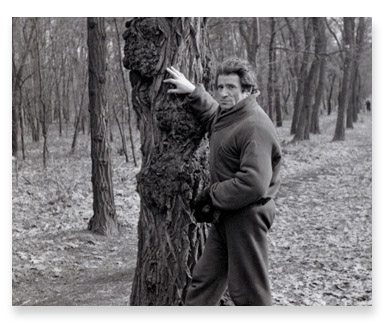
Distinguished Bulgarian artist. He finished The Fine Arts Academy, "Painting" in 1939 in Prof. Nikola Ganushev's class. At first he painted mainly landscapes and still-life as well as expressionist portraits. His first exhibition in 1936 established his reputation as a master of landscape and nature paintings, interior paintings, and still-life paintings; he showed courage in his colour choices and impressed the audience with his ability to paint air. In the 50s of the 20th century Vasil Ivanov started painting his cosmic visions using black paper on which he painted with white chalk. It was "Cosmos" as a topic that became emblematic for his work. His friends call him one of the first Bulgarian modernist painters and a pioneer of avant-gardism in our painting. The piano player Prof. Yuri Bukov invited Vasil Ivanov to live with him for a while in Paris and Switzerland. In Paris he exhibited his paintings and the exhibition was a success. Vasil Ivanov's paintings can be found in many private collections around the world. Georgi Stoyanov-Bigor, the critic, wrote in his memoirs that Luis Aragon, Pablo Picasso and Marc Chagall were familiar with his paintings and thought highly of them. Vasil Ivanov died in Sofia, on April 4th 1975.
In 1984 the National Club of Science Fiction Painters was named after him. The club supports the activities of the science-fiction and prognostics clubs in Bulgaria.
Master Peter Deunov's follower, he lived and worked for years in the Brotherhood settlement "Izgreva".
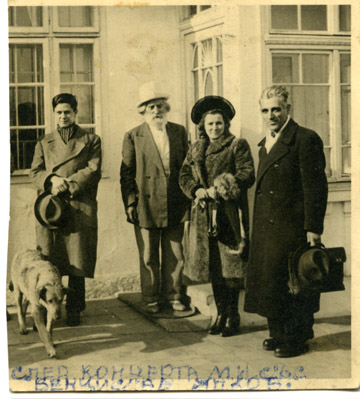
Tsvetana – Lilyana Tabakova (1913–1991)
Internationally renowned singer. Tsvetana- Lilyana Tabakova finished Sofia Musical School. The she studied for five years at Ecole Normale de Musique in Paris and graduated from both departments of this prestigious college – Opera and Concert.
After her return to Bulgaria Tsvetana- Lilyana Tabakova worked in the Opera House where she was given leading parts for coloratura soprano. Beside her work in the opera performances she also gave concerts and recorded songs at the radio.
Her opera career was not the most important role in her life. A year before she started working in the Opera, Tabakova met Master Peter Deunov and she often visited "Izgreva" settlement. She recorded all her talks with him since 1940 – most of them were about music and its role in human evolution. For four years Master Peter Deunov passed on to Tsvetana- Lilyana Tabakova the most mystical songs of his spiritual School.
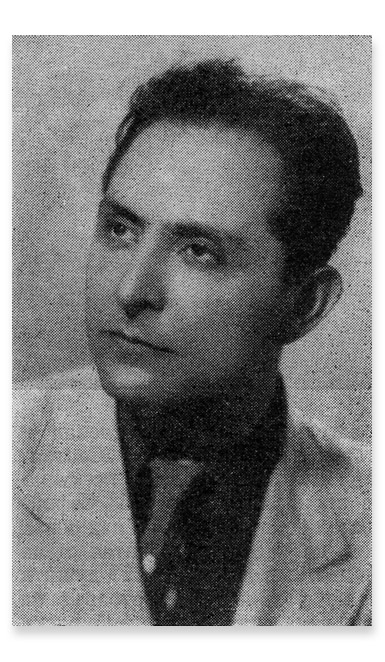
Prof. Dr. Stoyan Djudjev (1902 – 1997)
Musical folklore researcher and Esperanto follower. He finished Sofia State Musical Academy and studied at the History and Philology department of Paris University. In 1931 he presented his doctor's diploma thesis about the Bulgarian folk music. Rabindranat Tagor offered him a job at his university but Djudjev returned to Bulgaria to establish folk music as a subject of study at the Conservatory where he became a professor. He is the author of lot of significant studies about Bulgarian musical folklore – "Bulgarian Folk Choreography" (1945), "Theory of Bulgarian Folk Music" in 4 volumes (1954- 1961), "Musical Acoustic" (1958) and many articles about comparative musicology, syncretism of folk culture and the problems of society and music. He not only described the peculiarities of Bulgarian folklore but attracted world attention to it with his works.
He taught a lot of specialists: students, post-graduate students, doctors. Professor Doctor Stoyan Djudjev was a legend in Bulgarian ethno-musicology. He was a fervent Esperanto speaker, he contributed to "Bulgarian Esperanto Speaker" magazine and he was editor-in-chief of "Scienca mondo" ("Scientific world").
He was warded the international Herder award and the award of Bulgarian Science Academy, he was an honorary Doctor of State Musical Academy. A follower of Master Peter Deunov's ideas.
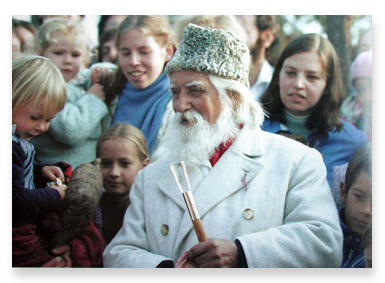
Mihail Ivanov (Omraam Mikhaël Aïvanhov) (1900 – 1986)
Mihail Ivanov was born in Serbtsi, Macedonia. Later his family moved to Varna. He had a tough childhood – his father's death, the poverty, the insecurity and the wars were a major factor for the development of his strong will, for the expanding of his consciousness and spiritual life.
In 1917 he met the Master Peter Deunov in Varna and became his disciple.
In 1937 onwards he lived in France.
"He, who is born anew, is a true spring from which clean water flows and along the banks of which a whole new civilization lies…" These were Mihail Ivanov's words in his first public lecture in Paris on 29th January 1938, in Luxemburg Hall in the Sorbonne Square.
In 1947 Mihail Ivanov and his brothers in spirit from France bought a land plot in one of the suburbs around Paris, Sevres. They called the property "Izgrev". Thus the French Universal White Brotherhood came into existence. In the South, near the Cote d'Azure, the Brotherhood has a small property called "Le Bonfin" since 1953.
In 1959 Mihail Ivanov travelled to India where he visited many ashrams and met many spiritual leaders. One of them – Maharadja Nimkaroli Babadji gave him the name Omraam Mikhaël Aïvanhov. After his return in 1960, his lectures were recorded on tape and are well preserved even now.
In 1967 he began a series of travel to make the Teaching widely known. He visited many countries and met state leaders.
In 1971 Publishing House "Prosveta" was established in Switzerland to publish his lectures and talks.
In 1981 Mihail Ivanov visited Bulgaria when he was invited by the Bulgarian government to celebrate 1300 anniversary of the establishment of the Bulgarian state.
He finished his journey on earth on 25the December 1986.
Due to Mihail Ivanov's efforts the Master's philosophy, music, and Paneurhythmy are known to thousands of followers around the world and the songs and word formulas are being chanted in Bulgarian.
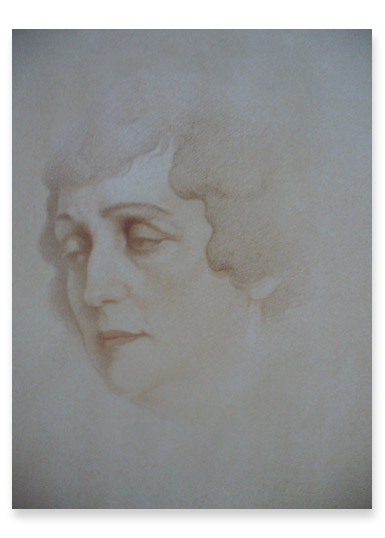
Mara Belcheva (Sept. 8th 1868, Sevlievo – March 16th 1937, Sofia).
She finished secondary school in Veliko Tarnovo. Then she studied in a Higher Education Institute for girls in Vienna. She was a teacher in Rousse and Sofia. After the murder of her husband, minister Hristo Belchev (1891) she left for Vienna to study philology. In 1903 she became a close friend of Pencho Slaveikov and she was his partner in life until his death. During the War of the Allies (1913) she was a nurse and teacher in Sofia. Belcheva was a poet and translator with broad cultural interests. She translated works of Friedrich Nietzsche – "Thus Spake Zarathustra" (1915), G. Hauptmann – "Sunken Bell", etc. She published her poems since 1907. Her comparatively small volume of poems is unique and special in the history of Bulgarian women's poetry.
She was influenced spiritually by her acquaintance with Master Peter Deunov and she wrote poems devoted to the eternal topics of human nature.
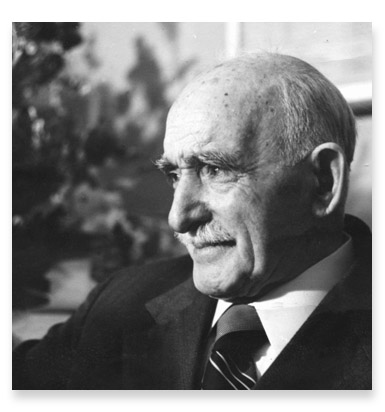
Peter Dimkov Lechitelyat (The Healer) (1886–1981)
He was born on December 19th 1886 in Sofia in the family of Ivan Dimkov – priest by calling. In 1899 he left for Saint Petersburg, Russia where he graduated from the Military Academy. In 1909 he joined the Dragoman regiment in Tzaribrod as a second lieutenant. He fought in the Balkan War, The War of the Allies, and World War I and was injured 8 times. During that period he helped a lot of soldiers suffering from cholera.
While in army service, he received all national medals and grew up in the military hierarchy. In 1936 he retired from the army as a colonel. His military services will be remembered in Bulgarian history. In Varna: he was in charge of fieldworks on Asparuhov val as well as the construction of the Arc – portal of 8th Primorski regiment, and the building of "Vladislav Varnenchik" park-mausoleum.
As captain of 21st infantry battalion in Karlovo in 1933 he saved Vasil Levski's house from destruction and supervised its renovation. In 1936 he retired as colonel of the reserve.
After 1936 onwards he worked as a healer in the country and abroad: traditional medicine, iris diagnostics, and herbal healing. He believed that first one must take care of the human soul and then treat the physical body, and he believed there was no incurable illness. He was a fervent adherent to the ideas of vegetarianism and life according to the laws of Nature and the Cosmos. His main work "Bulgarian Folk Medicine" was published in the 30s of the 20th century in three volumes and went through four editions. From 1944 to 1990 his books were banned by the political censure.
As a disciple of the Master Peter Deunov, Peter Dimkov participated in the life of the White Brotherhood community in "Izgreva" until the end of Deunov's life. After that, from 1944 to 1981, he took part in the secret gatherings of groups of brothers and sisters who preserved the Teaching for the future. It is said that he was the man who solicited Leonid Brezhnev (the Secretary General of the Communist Party in the USSR, whom he had treated), for the preservation of the grave of Master Peter Deunov in "Izgreva", in the place where the Russian Embassy is situated now.
From 1990 onwards his work regained great popularity – a national movement was started spontaneously which presents the ideas of the Healer to the younger generations and teaches them the principles of life in Nature's laws and the methods of the hew Teaching for spiritual development and personal growth.

An artist of greatest significance and world fame, successor of Renaissance traditions, classical master of portraits, landscapes and mystical insight in fine arts.
He was born in Varna in 1888. His family left for Saint Petersburg where he studied fine arts with Professor Nikolai Roerich. He also studied at Munich Fine Arts Academy. He worked as a shoemaker, tailor, construction worker, farm worker; he played the piano, balalaika and other musical instruments. He settled in Italy where he created his magnificent masterpieces and travelled across Europe, India and Brazil. In 1929 he painted Einstein's portrait and he gave it to him as a present. Einstein was deeply moved by the present and helped organize an exhibition of Boris Georgiev's pictures in Schulte Gallery in Berlin. This exhibition not only promoted the artist's work but it also provoked the art critic Hans Rosenhagen to call him "soul's artist" and these words later became the calling card of the famous Bulgarian.
He also painted the portraits of other great people – Mahatma Gandi, Rabindranat Tagor, Master Peter Deunov (whose follower he remained until his death), Djavaharlal Heru and others. His style was a harmonious unity of realism, romanticism and classicism. His paintings are being presented all over the world and represent an invaluable contribution to world cultural treasure. He remained true to his Bulgarian origin until his death.
He died in Rome on April 9th 1962 and was buried in Florence near Michelangelo's mausoleum in his beloved sister Katia's grave.

George Kurtev
“It is a great thing when a man is a disciple to the White Brotherhood-it is a privilege.To serve is also a privilege”
Artist George Kurtev from Argentina
George Kurtev visited Sunrise (Izgrev - in Bulgarian) in 1945. Before that he had an appointed meeting with the Teacher,which didn’t happen due to the Teacher’s leaving from this world in 27.12.1944г.He was shelterd to the Sunset by the brother Boris Nikolov.From this moment his life changes radically.At the Sunset he meets Boyan Boev,Mariq Todorova,George Tomalevski,Nevena Nedelcheva,Iliq Uzunov.After that he goes to Czechoslovakia and Sweden.There he receives financial support from the Argentine attaché working at the Argentine embassy and settles down to Argentina where he spents the rest of his life.
After many vicissitudes of fortune he gradually manages to cope with the situation.Eight years after his arrival to Argentina he has already had his own workshop which names “workshop of the new era” or his “temple for work”.At this workshop he makes a lot of metaloplastics which are an expression of his enormous spiritual potential,sense of beauty and of God’s greatness.He creates them with the mind of a devoted person,with the heart of a student and with the hands of a God’s worker.
During the years he spent beyond the borders of Bulgaria he does not suspend the connection with his ideological adherents from the Sunrise and the deed of the Teacher.With the help of his wife,Argentinean by birth,he translates many of the Teacher’s lectures into Spanish.He often writes letters to Boris Nikolov and they become close friends.In these letters he shares his worries,his nostalgia for Bulgaria,in brief-this is the spiritual confession of the artist to a true friend.George Kurtev keeps up a regular correspondence with sister I.Krysteva from Plovdiv and this correspondence continues to the end of his life.Sister Krysteva keeps the letters from the artist in her personal archive together with many pictures of his metaloplastics.She shared a part of them with us during our December meeting.
George Kurtev bestows his metaloplastics on a museum in Argentina just before his labours are over, past century, the end of the nineties.